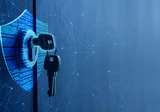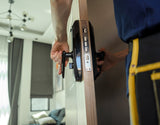Deadbolt vs. Deadlock: Which is Best for Your Home Security?
When it comes to making your home secure, choosing the right locks is essential to ensure the safety and peace of mind of your family. Strong deadbolts and deadlocks are at the forefront of home security, each offering unique benefits. But how do you determine which is better for your doors? In this article from Digital Locks, we'll provide a detailed review of both, helping you choose the best option for your specific needs.
Understanding Deadbolts: What They Are and How They Work
Deadbolts are products specifically designed to enhance security by preventing forced entry. Unlike traditional locks, a deadbolt requires a key to lock and unlock, and its mechanism resists physical tampering.
Key Features of Deadbolts:
-
Durability: Often manufactured with materials like nickel or black steel, they ensure long-term performance.
-
Variety: Available in a large range of styles to suit different door thicknesses and home designs.
-
Action: A simple turn of the key engages a sturdy bolt, making the lock effective against prying or kicking attempts.
The Basics of Deadlocks: Definition and Key Features
Deadlocks, on the other hand, offer an elevated level of security. They need a key to lock and unlock from both sides, ensuring that even if intruders break a window, they cannot unlock the door from the inside.
Why Choose Deadlocks?
-
Ideal for commercial and residential use.
-
Available in finishes like brown, nickel, or black, complementing various style preferences.
-
Designed to provide confidence and peace in protecting your property.
Key Differences Between Deadbolts and Deadlocks
When comparing deadbolt vs deadlock, the differences often come down to their mechanisms and intended use:
|
Feature |
Deadbolts |
Deadlocks |
|
Security Level |
High, resists physical force |
Very high, needs a key from both sides |
|
Ease of Use |
Simple one-side locking mechanism |
Requires a key to lock/unlock on both sides |
|
Applications |
Common in homes |
Preferred for added security in commercial settings |
|
Door Thickness |
Adaptable to different sizes |
May require precise specifications |
Pros and Cons of Deadbolts
Pros:
-
Affordable and widely available.
-
Compatible with most doors and installation processes.
-
Provides effective security for standard home settings.
Cons:
-
Single-side locking mechanisms may be less secure against certain entry tactics.
-
Durability can vary based on material and installation.
Pros and Cons of Deadlocks
Pros:
-
Enhanced confidence with double-key locking.
-
Extremely resistant to tampering and unauthorised access.
-
Complements a broad range of door styles and thicknesses.
Cons:
-
Slightly more complex to install, often requiring professional expertise.
-
May delay human action during emergencies if a key is misplaced.
How to Choose the Right Lock for Your Home Security Needs
Consider These Factors:
-
Security Needs: For maximum peace of mind, deadlocks may be the better choice, especially for entry points that need higher protection.
-
Style and Finish: Whether you prefer sleek black or classic nickel, ensure the lock matches your door's style.
-
Durability: Opt for locks manufactured with premium materials for long-lasting performance.
-
Door Thickness: Measure your doors carefully to ensure the lock fits securely.
-
Budget: If affordability is a concern, deadbolts provide a cost-effective solution.
Frequently Asked Questions
Q1. Can I install both a deadbolt and a deadlock on the same door?
A1. Yes, installing both can significantly enhance security, though professional guidance may be needed to ensure compatibility and is recommended.
Q2. Which is more secure: a deadbolt or a deadlock?
A2. Deadlocks generally offer higher security due to their double-key mechanism.
Q3. Is deadbolt the same as deadlock?
A3. No, deadbolts and deadlocks have distinct mechanisms and applications, each suited to specific needs.
Q4. How do you tell if a lock is a deadlock?
A4. A deadlock requires a key for both locking and unlocking, ensuring added protection from the inside.
Q5. Why is it called deadbolt?
A5. The term "dead" refers to its non-spring mechanism, requiring manual action to engage or disengage.
Q6. What is the difference between a deadbolt and a deadlatch?
A6. A deadlatch uses a spring-loaded latch bolt, while a deadbolt locks securely in place without relying on a spring mechanism.
Whether you opt for deadbolts or deadlocks, the right choice depends on your needs. Evaluate your doors, view your options confidently, and ensure the locks you select provide the security your property deserves.
Still trying to decide which lock is best for you? Proceeding with professional help from Digital Locks ensures the right connection between your lock type and your security needs. Contact us with your queries and find the perfect solution for your home.




0 comments